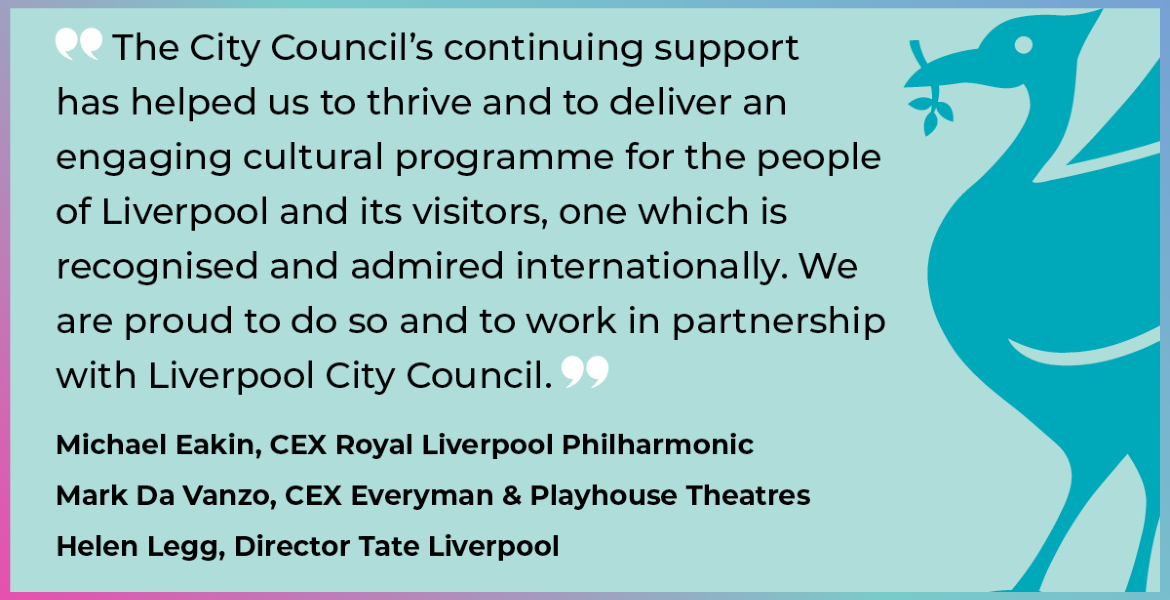As local authorities continue to feel the squeeze when it comes to investing in the cultural sector, Liverpool City Council’s Cabinet Member responsible for Culture, Councillor Harry Doyle, reflects on the current financial landscape, and his pride that Liverpool continues to support this vital local sector.
We need to talk about culture. As a Cabinet Member who has culture in his job title it’s genuinely something I talk about every day – but for the most-part – through a Liverpool lens.
It has been encouraging to see a more national conversation in recent weeks about preserving and nurturing the cultural sector as a whole, unfortunately, this had to come in the context of Birmingham City Council being forced into ‘cultural deprivation’ as a result of budget cuts.
In Liverpool, we are well aware of the challenging financial decisions that have been – and continue to be made – in order to allow us to deliver essential core services. We are extremely proud that we have been able to continue to support our local arts organisations and deliver a cultural programme of events for residents and visitors, but as we scan the cultural horizon there isn’t an end in sight to austerity.
Cities and towns across the country need to come together as a collective – there needs to be a unanimous cheer for change. The power needs to be in the hands of all local authorities and we need direct say on how spend is distributed.
We would also welcome a change in legislation which allows us to introduce a visitor levy, or tourist tax if you will – we need to follow in the footsteps of Scotland which is making great strides in this area with it being overwhelmingly viewed as a force for good.
There is frustration around the fact we continue to have to make the argument underpinning the power of culture – surely we should be well past that by now?
Most iconic cultural organisations throughout the UK are based on a subsidised model. Similar to the NHS, the cultural offer we know and love today has been built over the decades by public investment, whether it be via central or local government. But for over a decade, this investment has decreased year-on-year, and combine that with wage inflation, the cost of outgoings rocketing and audiences themselves facing a cost-of-living crisis, it’s the perfect storm for a turbulent arts outlook. And as a city that has whole-heartedly believed in this sector for more than 20 years, this weighs heavy on our cultural conscience.
Questions need to be seriously asked about the current frameworks in place and how funding is administered as it’s clearly not working. Arts organisations across Liverpool and indeed the UK have proactively diversified their income streams and moved to a more commercial approach, as opposed to subsidised, models, but given the challenges facing the sector every day, we have reached a point where venues across the country are having to close their doors and artists are being forced to step away from their creativity and onto new career paths. There is an existential funding crisis in the arts that needs to be addressed if we are to save the sector that is so intrinsically linked to our cultural identity.
And then in the midst of that frustration, it’s still heart-warming when the sector reaches out and acknowledges the continuing support here in Liverpool from Liverpool City Council. It allows us to step back a bit and recognise that although we would love to help more, what we are doing in continuing to fund cultural organisations in Liverpool, really does make a difference.
“Over many years Liverpool City Council has understood that the importance of a vibrant cultural sector is aligned to the success of the city.” Those are the words of the leaders of the Royal Liverpool Philharmonic, the Everyman & Playhouse Theatres and Tate Liverpool – three iconic institutions which employ over 1,000 people between them – and have a local economic contribution of over £100million. The stature of these three organisations alone is impressive, so why is it a continuous battle to secure funding for something that delivers on every level?
We need to think and act differently if any positive, viable change is to happen. And we’re all savvy enough to understand it’s not going to happen overnight. But the more we talk about the challenges facing our much-loved cultural sector, and the more noise we can make, surely someone has to sit up and pay attention?
After all, it’s not for art for art’s sake – it’s art for everyone’s sake.
Councillor Harry Doyle, Liverpool City Council’s Cabinet Member responsible for Culture


